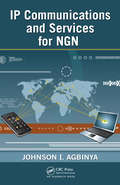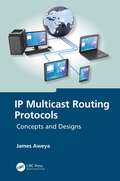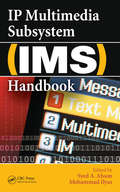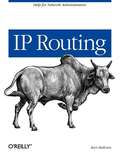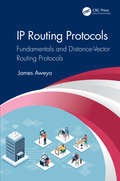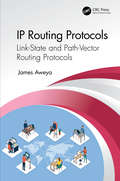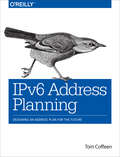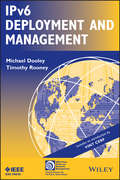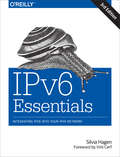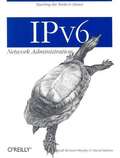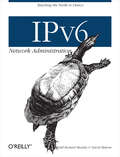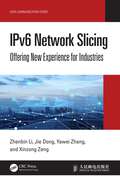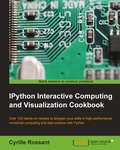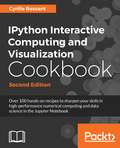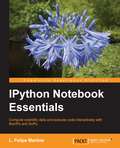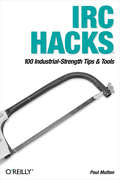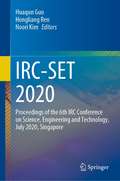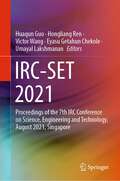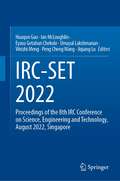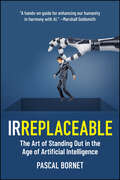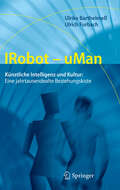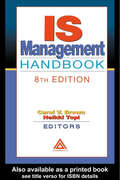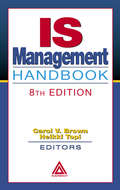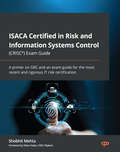- Table View
- List View
IP Communications and Services for NGN
by Johnson I AgbinyaRapid deployment and acceptance of broadband networks, including the 802.11 a/b/g, 3G cellular networks, WiMAX, and emerging 4G cellular IP networks, have sparked a growing reliance on voice over IP and the quickly emerging IP TV and Mobile TV. Providing the necessary background and technical understanding to stay abreast of and even ahead of the IP trend, IP Communications and Services for NGN explores IP development for the delivery of next generation mobile services. Packed with detailed illustrations, this cutting-edge reference examines the primary IP protocols (IPv4 and IPv6), real-time protocols, and three major IP services (VoIP, IPTV, and Mobile TV). It clearly explains the different architectures of fixed, mobile, and wireless networks along with the major advantages and disadvantages of each. It includes coverage of the latest in:The VoIP MarketSCTP and Vertical HandoffRSVP: Resource Reservation ProtocolMPLS: MultiProtocol Label SwitchingSIP: Session Initiation ProtocolIMS: IP Multimedia SubsystemRTSP: Real-Time Streaming ProtocolRTP: Real-Time Transport ProtocolIPTV System Architectures and IPTV System DescriptionsWith a detailed listing of commonly used acronyms, along with a clear description of the role IP is likely to play in the development of next generation mobile services, this book provides educators, industry practitioners, regulators, and subscribers with the ideal starting point for developing the understanding required to deploy, train, and use IP services effectively and efficiently.
IP Multicast Routing Protocols: Concepts and Designs
by James AweyaThis book discusses the fundamental concepts that are essential to understanding IP multicast communication. The material covers the well‑known IP multicast routing protocols, along with the rationale behind each protocol. The book starts with the basic building blocks of multicast communications and networks, then progresses into the common multicast group management methods used, and finally into the various, well‑known multicast routing protocols used in today’s networks. IP multicast provides significant benefits to network operators by allowing the delivery of information to multiple receivers simultaneously with less network bandwidth consumption than using unicast transmission. Applications that can benefit greatly from multicast communications and multicast‑enabled networks include audio and video conferencing, collaborative computing, online group learning and training, multimedia broadcasting, multi‑participant online gaming, and stock market trading. This book’s goal is to present the main concepts and applications, allowing readers to develop a better understanding of IP multicast communication. IP Multicast Routing Protocols: Concepts and Designs presents material from a practicing engineer’s perspective, linking theory and fundamental concepts to common industry practices and real‑world examples. The discussion is presented in a simple style to make it comprehensible and appealing to undergraduate‑ and graduate‑level students, research and practicing engineers, scientists, IT personnel, and network engineers. It is geared toward readers who want to understand the concepts and theory of IP multicast routing protocols, yet want these to be tied to clearly illustrated and close‑to‑real‑world example systems and networks.
IP Multimedia Subsystem (IMS) Handbook
by Mohammad Ilyas Syed A. AhsonTake Part in the Future of Wireless/Wireline Convergence The IP multimedia subsystem (IMS), established as the foundation for future wireless and wireline convergence, is the bedrock that will facilitate easy deployment on new, rich, personalized multimedia communication services that mix telecom and data services. Designers, planners, and researchers of communication systems will need to make full use of the technology occurring with this convergence if they want to be the ones providing end users with new and efficient services that are as cost-effective as they are innovative. To provide researchers and technicians with the tools they need to optimize their role in this communication revolution, the IP Multimedia Subsystem (IMS) Handbook presents all the technical aspects of the IMS needed to support the growth of digital traffic and the implementation of underlying networks. This guide covers everything from basic concepts to research-grade material, including the future direction of the architecture. Organized in three sections, the book brings together the technical savvy of 50 pioneering experts from around the world, providing complete coverage of relevant concepts, technologies, and services. Learn How IMS Will Speed InnovationFilling the gap between existing traditional telecommunications and Internet technologies, IMS has led to an environment in which new services and concepts are introduced more quickly than ever before, such as reusable service components and real-time integration. The technology promises to be a cost-effective evolutionary path to future wireless and wireline convergences that will meet next-generation service requirements.
IP Routing
by Ravi MalhotraThis concise guide offers the basic concepts of IP routing, free of hype and jargon. It begins with the simplest routing protocol, RIP, and then proceeds in successive chapters to IGRP, EIGRP, RIP2, OSPF, and finally to the most complex, BGP. By the end, you will have mastered not only the fundamentals of all the major routing protocols, but also the underlying principles on which they are based.
IP Routing Protocols: Fundamentals and Distance-Vector Routing Protocols
by James AweyaThis book focuses on the fundamental concepts of IP routing and distance-vector routing protocols (RIPv2 and EIGRP). It discusses routing protocols from a practicing engineer’s perspective, linking theory and fundamental concepts to common practices and everyday examples. The book benefits and reflects the author’s more than 22 years of designing and working with IP routing devices and protocols (and Telecoms systems, in general). Every aspect of the book is written to reflect current best practices using real-world examples. This book describes the various methods used by routers to learn routing information. The author includes discussion of the characteristics of the different dynamic routing protocols, and how they differ in design and operation. He explains the processing steps involved in forwarding IP packets through an IP router to their destination and discusses the various mechanisms IP routers use for controlling routing in networks. The discussion is presented in a simple style to make it comprehensible and appealing to undergraduate and graduate level students, research and practicing engineers, scientists, IT personnel, and network engineers. It is geared toward readers who want to understand the concepts and theory of IP routing protocols, through real-world example systems and networks. Focuses on the fundamental concepts of IP routing and distance-vector routing protocols (RIPv2 and EIGRP). Describes the various methods used by routers to learn routing information. Includes discussion of the characteristics of the different dynamic routing protocols, and how they differ in design and operation. Provides detailed descriptions of the most common distance-vector routing protocols RIPv2 and EIGRP. Discusses the various mechanisms IP routers use for controlling routing in networks. James Aweya, PhD, is a chief research scientist at the Etisalat British Telecom Innovation Center (EBTIC), Khalifa University, Abu Dhabi, UAE. He has authored four books including this book and is a senior member of the Institute of Electrical and Electronics Engineers (IEEE).
IP Routing Protocols: Link-State and Path-Vector Routing Protocols
by James AweyaThis book discusses link-state routing protocols (OSPF and IS-IS), and the path-vector routing protocol (BGP). It covers their most identifying characteristics, operations, and the databases they maintain. Material is presented from a practicing engineer’s perspective, linking theory and fundamental concepts to common practices and real-world examples. Every aspect of the book is written to reflect current best practices using real-world examples. The book begins with a detailed description of the OSPF area types and hierarchical routing, and the different types of routers used in an OSPF autonomous system. The author goes on to describe in detail the different OSPF packet types, and inbound and outbound processing of OSPF link-state advertisements (LSAs). Next, the book gives an overview of the main features of IS-IS. The author then discusses the two-level routing hierarchy for controlling the distribution of intra-domain (Level 1) and inter-domain (Level 2) routing information within an IS-IS routing domain. He then describes in detail IS-IS network address formats, IS-IS routing metrics, IS-IS packet types, IS-IS network types and adjacency formation, IS-IS LSDB and synchronization, and IS-IS authentication. The book then reviews the main concepts of path-vector routing protocols, and describes BGP packet types, BGP session states and Finite State Machine, BGP path attributes types, and BGP Autonomous System Numbers (ASNs). Focuses solely on link-state routing protocols (OSPF and IS-IS), and the only path-vector routing protocol in use today (BGP). Reviews the basic concepts underlying the design of IS-IS and provides a detailed description of IS-IS area types and hierarchical routing, and the different types of routers used by IS-IS. Discusses the two-level routing hierarchy for controlling the distribution of intra-domain (Level 1) and inter-domain (Level 2) routing information within an IS-IS routing domain. Describes in detail BGP packet types, BGP session states and Finite State Machine, BGP path attributes types, and BGP ASNs, includes a high-level view of the typical BGP router and its components, and inbound and outbound message processing. James Aweya, PhD, is a chief research scientist at the Etisalat British Telecom Innovation Center (EBTIC), Khalifa University, Abu Dhabi, UAE. He has authored four books including this book and is a senior member of the Institute of Electrical and Electronics Engineers (IEEE).
IPv6 Address Planning: Designing an Address Plan for the Future
by Tom CoffeenIf you’re ready to join the move to IPv6, this comprehensive guide gets you started by showing you how to create an effective IPv6 address plan. In three example-driven sections—preparation, design, and maintenance—you’ll learn principles and best practices for designing, deploying, and maintaining an address plan far beyond what’s possible with IPv4 networks.During the course of the book, you’ll walk through the process of building a sample address plan for a fictional company. Enterprise IT network architects, engineers, and administrators will see firsthand how IPv6 provides opportunities for creating an operationally efficient plan that’s scalable, flexible, extensible, manageable, and durable.Explore IPv6 addressing basics, including representation, structure, and typesManage risks and costs by using a three-phase approach for deploying IPv6Dig into IPv6 subnetting methods and learn how they differ from IPv4Determine the appropriate size and type of the IPv6 allocation you requireApply current network management tools to IPv6Use IPv6 renumbering methods that enable greater network scale and easier integrationImplement policies and practices to keep IPv6 addresses reachable
IPv6 Deployment and Management (IEEE Press Series on Networks and Service Management #22)
by Michael Dooley Timothy RooneyWith the announcement in 2011 that the current Internet Protocol (IP), IPv4, has nearly run out, interest in IPv6 -- the latest IP version -- has grown substantially. This book describes IPv6 technology and its repercussions on organizations, including strategies and techniques for assessing the impact of deploying IPv6 on a network, discovering current IP assets, assessing network readiness, creating a plan to deploy IPv6 while retaining IPv4 connectivity, and for managing a dual protocol IPv4-IPv6 network. It is a must read for IP network engineers, managers, and those who work in IT.
IPv6 Essentials: Integrating IPv6 into Your IPv4 Network
by Silvia HagenIf your organization is gearing up for IPv6, this in-depth book provides the practical information and guidance you need to plan for, design, and implement this vastly improved protocol. Author Silvia Hagen takes system and network administrators, engineers, and network designers through the technical details of IPv6 features and functions, and provides options for those who need to integrate IPv6 with their current IPv4 infrastructure.The flood of Internet-enabled devices has made migrating to IPv6 a paramount concern worldwide. In this updated edition, Hagen distills more than ten years of studying, working with, and consulting with enterprises on IPv6. It’s the only book of its kind.IPv6 Essentials covers:Address architecture, header structure, and the ICMPv6 message formatIPv6 mechanisms such as Neighbor Discovery, Stateless Address autoconfiguration, and Duplicate Address detectionNetwork-related aspects and services: Layer 2 support, Upper Layer Protocols, and ChecksumsIPv6 security: general practices, IPSec basics, IPv6 security elements, and enterprise security modelsTransitioning to IPv6: dual-stack operation, tunneling, and translation techniquesMobile IPv6: technology for a new generation of mobile servicesPlanning options, integration scenarios, address plan, best practices, and dos and don’ts
IPv6 Network Administration
by David Malone Niall MurphyThis essential guide explains what works, what doesn't, and most of all, what's practical about IPv6--the next-generation Internet standard. A must-have for network administrators everywhere looking to fix their network's scalability and management problems. Also covers other IPv6 benefits, such as routing, integrated auto-configuration, quality-of-services (QoS), enhanced mobility, and end-to-end security.
IPv6 Network Administration: Teaching the Turtle to Dance
by David Malone Niall Richard MurphyWhat once seemed nearly impossible has turned into reality. The number of available Internet addresses is now nearly exhausted, due mostly to the explosion of commercial websites and entries from an expanding number of countries. This growing shortage has effectively put the Internet community--and some of its most brilliant engineers--on alert for the last decade.Their solution was to create IPv6, a new Internet standard which will ultimately replace the current and antiquated IPv4. As the new backbone of the Internet, this new protocol would fix the most difficult problems that the Internet faces today--scalability and management. And even though IPv6's implementation has met with some resistance over the past few years, all signs are now pointing to its gradual worldwide adoption in the very near future. Sooner or later, all network administrators will need to understand IPv6, and now is a good time to get started.IPv6 Network Administration offers administrators the complete inside info on IPv6. This book reveals the many benefits as well as the potential downsides of this next-generation protocol. It also shows readers exactly how to set up and administer an IPv6 network.A must-have for network administrators everywhere, IPv6 Network Administration delivers an even-handed approach to what will be the most fundamental change to the Internet since its inception. Some of the other IPv6 assets that are covered include:routingintegrated auto-configurationquality-of-services (QoS)enhanced mobilityend-to-end securityIPv6 Network Administration explains what works, what doesn't, and most of all, what's practical when considering upgrading networks from the current protocol to IPv6.
IPv6 Network Slicing: Offering New Experience for Industries (Data Communication Series)
by Jie Dong Zhenbin Li Yawei Zhang Xinzong ZengThis book is an essential guide to IPv6 network slicing. It covers both the fundamentals and cutting-edge technologies of IPv6 network slicing, and provides insights into future industry developments.IP network slicing is an architectural innovation that provides multiple dedicated logical networks on a shared physical network. It comprises a complete set of solutions designed to meet the differentiated service requirements of the 5G and cloud era. This book focuses on IP network slicing based on the data plane of IPv6, a second-generation network layer protocol standard designed to address many of the problems encountered with IPv4. The book explores the technical implementation of IPv6 network slicing by introducing its architecture, implementation solutions, resource partitioning technologies, data plane technologies, and control plane technologies. It also explains how to deploy IPv6 network slicing through slice controllers and provides deployment suggestions based on Huawei practices.It is a must-read for professional engineers involved in network planning, design, and technology support. Researchers and students in information and communication technology and communication system design will also find it useful.
IPython Interactive Computing and Visualization Cookbook
by Cyrille RossantIntended to anyone interested in numerical computing and data science: students, researchers, teachers, engineers, analysts, hobbyists... Basic knowledge of Python/NumPy is recommended. Some skills in mathematics will help you understand the theory behind the computational methods.
IPython Interactive Computing and Visualization Cookbook Second Edition: Over 100 Hands-on Recipes To Sharpen Your Skills In High-performance Numerical Computing And Data Science In The Jupyter Notebook
by Cyrille Rossant<P><P>Learn to use IPython and Jupyter Notebook for your data analysis and visualization work <P><P>Key Features <P><P>Leverage the Jupyter Notebook for interactive data science and visualization <P><P>Become an expert in high-performance computing and visualization for data analysis and scientific modeling <P><P>Comprehensive coverage of scientific computing through many hands-on, example-driven recipes with detailed, step-by-step explanations <P><P>Book Description <P><P>Python is one of the leading open source platforms for data science and numerical computing. IPython and the associated Jupyter Notebook offer efficient interfaces to Python for data analysis and interactive visualization, and constitute an ideal gateway to the platform. <P><P>This second edition of IPython Interactive Computing and Visualization Cookbook contains many ready-to-use, focused recipes for high-performance scientific computing and data analysis, from the latest IPython/Jupyter features to the most advanced tricks, to help you write better and faster code. You will apply these state-of-the-art methods to various real-world examples, illustrating topics in applied mathematics, scientific modeling, and machine learning. <P><P>The first part of the book covers programming techniques: code quality and reproducibility, code optimization, high-performance computing through just-in-time compilation, parallel computing, and graphics card programming. The second part tackles data science, statistics, machine learning, signal and image processing, dynamical systems, and pure and applied mathematics. <P><P>What you will learn <P><P>Master all features of the Jupyter Notebook <P><P>Code better: write high-quality, readable, and well-tested programs; profile and optimize your code; and conduct reproducible interactive computing experiments <P><P>Visualize data and create interactive plots in the Jupyter Notebook <P><P>Write blazingly fast Python programs with NumPy, ctypes, Numba, Cython, OpenMP, GPU programming (CUDA), parallel IPython, Dask, and more <P><P>Analyze data with Bayesian or frequentist statistics (Pandas, PyMC, and R), and learn from actual data through machine learning (scikit-learn) <P><P>Gain valuable insights into signals, images, and sounds with SciPy, scikit-image, and OpenCV <P><P>Simulate deterministic and stochastic dynamical systems in Python <P><P>Familiarize yourself with math in Python using SymPy and Sage: algebra, analysis, logic, graphs, geometry, and probability theory <P><P>Who This Book Is For <P><P>This book is for anyone interested in numerical computing and data science: students, researchers, teachers, engineers, analysts, and hobbyists. Basic knowledge of Python/NumPy is recommended. Some skills in mathematics will help you understand the theory behind the computational methods.
IPython Interactive Computing and Visualization Cookbook, Second Edition: Over 100 hands-on recipes to sharpen your skills in high-performance numerical computing and data science in the Jupyter Notebook
by Cyrille RossantLearn to use IPython and Jupyter Notebook for your data analysis and visualization work. Key Features Leverage the Jupyter Notebook for interactive data science and visualization Become an expert in high-performance computing and visualization for data analysis and scientific modeling A comprehensive coverage of scientific computing through many hands-on, example-driven recipes with detailed, step-by-step explanations Book Description Python is one of the leading open source platforms for data science and numerical computing. IPython and the associated Jupyter Notebook offer efficient interfaces to Python for data analysis and interactive visualization, and they constitute an ideal gateway to the platform. IPython Interactive Computing and Visualization Cookbook, Second Edition contains many ready-to-use, focused recipes for high-performance scientific computing and data analysis, from the latest IPython/Jupyter features to the most advanced tricks, to help you write better and faster code. You will apply these state-of-the-art methods to various real-world examples, illustrating topics in applied mathematics, scientific modeling, and machine learning. The first part of the book covers programming techniques: code quality and reproducibility, code optimization, high-performance computing through just-in-time compilation, parallel computing, and graphics card programming. The second part tackles data science, statistics, machine learning, signal and image processing, dynamical systems, and pure and applied mathematics. What you will learn Master all features of the Jupyter Notebook Code better: write high-quality, readable, and well-tested programs; profile and optimize your code; and conduct reproducible interactive computing experiments Visualize data and create interactive plots in the Jupyter Notebook Write blazingly fast Python programs with NumPy, ctypes, Numba, Cython, OpenMP, GPU programming (CUDA), parallel IPython, Dask, and more Analyze data with Bayesian or frequentist statistics (Pandas, PyMC, and R), and learn from actual data through machine learning (scikit-learn) Gain valuable insights into signals, images, and sounds with SciPy, scikit-image, and OpenCV Simulate deterministic and stochastic dynamical systems in Python Familiarize yourself with math in Python using SymPy and Sage: algebra, analysis, logic, graphs, geometry, and probability theory Who this book is for This book is intended for anyone interested in numerical computing and data science: students, researchers, teachers, engineers, analysts, and hobbyists. A basic knowledge of Python/NumPy is recommended. Some skills in mathematics will help you understand the theory behind the computational methods.
IPython Notebook Essentials
by L. Felipe MartinsIf you are a professional, student, or educator who wants to learn to use IPython Notebook as a tool for technical and scientific computing, visualization, and data analysis, this is the book for you. This book will prove valuable for anyone that needs to do computations in an agile environment.
IRC Hacks: 100 Industrial-Strength Tips & Tools
by Paul MuttonIRC (Internet Relay Chat) may very well turn out to be the world's most successful hack. In 1988, Jarkko Oikarinen wrote the original IRC program at the University of Oulu, Finland. As he says in his foreword, "IRC started as one summer trainee's programming exercise. A hack grew into a software development project that hundreds of people participated in, and then became a worldwide environment where tens of thousands of people now spend time with each other. I have found many of my friends through IRC and learnt a significant part of my present software engineering knowledge while using and working with IRC. That would not have been possible without learning from code examples and hacks from others".IRC has continued to grow in popularity since its inception. Millions of people from all over the world now use IRC to chat with friends, discuss projects and collaborate on research. With a simple, clearly defined protocol, IRC has become one of the most accessible chat environments, with clients written for a multitude of operating systems. And IRC is more than just a simple chat system it is a network of intercommunicating servers, allowing thousands of clients to connect from anywhere in the world using the IRC protocol.While IRC is easy to get into and many people are happy to use it without being aware of what's happening under the hood, there are those who hunger for more knowledge, and this book is for them. IRC Hacks is a collection of tips and tools that cover just about everything needed to become a true IRC master, featuring contributions from some of the most renowned IRC hackers, many of whom collaborated on IRC, grouping together to form the channel #irchacks on the freenode IRC network (irc.freenode.net).Like all of our Hacks books, there are many different ways to use IRC Hacks. You can read the book from cover to cover, but you might be better served by picking an interesting item from the table of contents and just diving in.If you're relatively new to IRC, you should considering starting with a few hacks from each progressive chapter. Chapter 1 starts you off by showing you how to connect to IRC, while Chapter 2 acquaints you with the everyday concepts you'll need to use IRC effectively. Chapter 3 is all about users and channels, and introduces the first pieces of code. Chapter 4 shows you how to make useful enhancements to IRC clients.Chapter 5 is where you will learn the basics about creating IRC bots, with Chapters 6-12 introducing more complex bots that can be used for logging, servicing communities, searching, announcing, networking, managing channels or simply for having fun. Chapter 13 delves into the IRC protocol in more detail, and Chapter 14 demonstrates some interesting alternative methods for connecting to IRC. Finally, Chapter 15 will move you on to new pastures by showing you how to set up your own IRC server.This book presents an opportunity to learn how IRC works and how to make best use of some of the features that have made it the most successful, most scalable, and most mature chat system on this planet. IRC Hacks delves deep into the possibilities.
IRC-SET 2020: Proceedings of the 6th IRC Conference on Science, Engineering and Technology, July 2020, Singapore
by Hongliang Ren Huaqun Guo Noori KimThis book highlights leading-edge research in multi-disciplinary areas in Physics, Engineering, Medicine, and Health care, from the 6th IRC Conference on Science, Engineering and Technology (IRC-SET 2020) held in July 2020 at Singapore. The papers were shortlisted after extensive rounds of reviews by a panel of esteemed individuals who are pioneers in their domains. The book also contains excerpts of the speeches by eminent personalities who graced the occasion, thereby providing written documentation of the event.
IRC-SET 2021: Proceedings of the 7th IRC Conference on Science, Engineering and Technology, August 2021, Singapore
by Hongliang Ren Huaqun Guo Victor Wang Eyasu Getahun Chekole Umayal LakshmananThis book highlights contemporary state of research in multidisciplinary areas in computer science, computer engineering, chemical engineering, mechanical engineering, physics, biomedical sciences, life sciences, medicine, and health care. The accepted submissions to the 7th IRC Conference on Science, Engineering and Technology (IRC-SET 2021) that were presented on August 7, 2021, are published in this conference proceedings. The papers presented here were shortlisted after extensive rounds of rigorous reviews by a panel of esteemed individuals who are pioneers and experts in their respective domains.
IRC-SET 2022: Proceedings of the 8th IRC Conference on Science, Engineering and Technology, August 2022, Singapore
by Weizhi Meng Huaqun Guo Eyasu Getahun Chekole Umayal Lakshmanan Ian McLoughlin Peng Cheng Wang Jiqiang LuThis book highlights contemporary state of research in multi-disciplinary areas in Physics, Biomedical Sciences, Chemical Engineering, Mechanical Engineering, Computer Science/Engineering, Life Sciences, and Healthcare. The accepted submissions to the 8th IRC Conference on Science, Engineering and Technology (IRC-SET 2022) that were presented on 6th August 2022, are published in this conference proceedings. The papers presented here were shortlisted after extensive rounds of rigorous reviews by a panel of esteemed individuals who are pioneers and experts in their respective domains.
IRREPLACEABLE: The Art of Standing Out in the Age of Artificial Intelligence
by Pascal BornetPascal Bornet, an award-winning AI expert, former McKinsey executive, and Top Voice in Technology with over 1 million LinkedIn followers, unveils the ultimate guide for working, living, and leading organizations in a rapidly changing, AI-driven world. With over 20 years of pioneering research at the human-AI intersection, Bornet reveals the secrets to living in harmony with AI while cultivating uniquely human qualities. He introduces the Three Competencies of the Future that we need to develop urgently to thrive in our new world. In IRREPLACEABLE, you will discover: Techniques to boost your career using AI—without losing your job to automation Secrets to unlocking your uniquely human abilities—ones AI can NEVER replicate Counterintuitive methods to raise Future-ready children Strategies to avoid falling into the "AI Obesity" trap Blueprints for leveraging AI to turn your company into an unstoppable force of innovation Whether you're an individual looking to future-proof your career, a parent aiming to raise future-proof children, or a business leader eager to steer your organization through technological disruption, IRREPLACEABLE offers a universal and comprehensive framework. AI is not the destination; it's the vehicle that takes us to a more human future, and this book is your GPS. Stand out. Become IRREPLACEABLE.
IRobot - uMan
by Ulrich Furbach Ulrike BarthelmeßWarum werden Roboter oft als bedrohlich empfunden? Können künstliche Systeme Emotionen und Bewusstsein haben? Die Autoren gehen von der These aus, dass die Literatur- und Geistesgeschichte uns helfen kann, aktuelle Entwicklungen der Robotik unvoreingenommen zu betrachten. Denn ob es um mittelalterliche Mythen, androide Roboter der Romantik, die Aufklärung oder die Entwicklung der künstlichen Intelligenz geht, stets stellt sich die Frage nach dem, was der Mensch ist, was sein Bewusstsein ausmacht und was ihn von anderen Wesen unterscheidet.
IS Management Handbook
by Heikki Topi Carol V. BrownIn systems analysis, programming, development, or operations, improving productivity and service - doing more with less - is the major challenge. Regardless of your management level, the Handbook gives you the advice and support you need to survive and prosper in the competitive environment. It is the only comprehensive and timely source of technic
IS Management Handbook
by Carol V. Brown Heikki TopiIT management and staff are called upon to perform the almost-impossible tasks of evaluating, purchasing, integrating, and maintaining complex IT systems, and directing these systems to meet the ever-changing goals of an organization. Add to that the spending restraints of a down economy, and IT managers find themselves in need of a thoughtful, rea
ISACA Certified in Risk and Information Systems Control (CRISC®) Exam Guide: A primer on GRC and an exam guide for the most recent and rigorous IT risk certification
by Shobhit MehtaPrepare to pass the ISACA CRISC exam with confidence, gain high-value skills, and propel yourself toward IT risk management masteryKey FeaturesGain end-to-end coverage of all the topics assessed in the ISACA CRISC examApply and embed your learning with the help of practice quizzes and self-assessment questionsHave an in-depth guide handy as you progress in your enterprise IT risk management careerPurchase of the print or Kindle book includes a free PDF eBookBook DescriptionFor beginners and experienced IT risk professionals alike, acing the ISACA CRISC exam is no mean feat, and the application of this advanced skillset in your daily work poses a challenge. The ISACA Certified in Risk and Information Systems Control (CRISC®) Certification Guide is a comprehensive guide to CRISC certification and beyond that’ll help you to approach these daunting challenges with its step-by-step coverage of all aspects of the exam content and develop a highly sought-after skillset in the process. This book is divided into six sections, with each section equipped with everything you need to get to grips with the domains covered in the exam. There’ll be no surprises on exam day – from GRC to ethical risk management, third-party security concerns to the ins and outs of control design, and IDS/IPS to the SDLC, no stone is left unturned in this book’s systematic design covering all the topics so that you can sit for the exam with confidence. What’s more, there are chapter-end self-assessment questions for you to test all that you’ve learned, as well as two book-end practice quizzes to really give you a leg up. By the end of this CRISC exam study guide, you’ll not just have what it takes to breeze through the certification process, but will also be equipped with an invaluable resource to accompany you on your career path.What you will learnAdopt the ISACA mindset and learn to apply it when attempting the CRISC examGrasp the three lines of defense model and understand risk capacityExplore the threat landscape and figure out vulnerability managementFamiliarize yourself with the concepts of BIA, RPO, RTO, and moreGet to grips with the four stages of risk responseManage third-party security risks and secure your systems with easeUse a full arsenal of InfoSec tools to protect your organizationTest your knowledge with self-assessment questions and practice quizzesWho this book is forIf you are a GRC or a risk management professional with experience in the management of IT audits or in the design, implementation, monitoring, and maintenance of IS controls, or are gearing up to take the CRISC exam, then this CRISC book is for you. Security analysts, penetration testers, SOC analysts, PMs, and other security or management professionals and executives will also benefit from this book. The book assumes prior experience of security concepts.
